#mythohistory
Explore tagged Tumblr posts
Text



Three images of Lucretia by Artemisia Gentileschi.
(CW: SA) Lucretia, say Roman historians, was a virtuous married woman, who lived ca. 500 BCE. She was violated by Sextus Tarquinius, a son of what would be the last king of Rome, Lucius Tarquinius Superbus. Lucretia, reportedly, then called in her father and husband with witnesses, told them of this act of violence, and stabbed herself.
Her husband, seeing his beloved wife dead, took the bloody knife and swore the following oath on it, passing it to the other men to likewise swear:
"By this blood—most pure before the outrage wrought by the king's son—I swear, and you, O gods, I call to witness that I will drive hence Lucius Tarquinius Superbus, together with his cursed wife and his whole blood, with fire and sword and every means in my power, and I will not suffer them or anyone else to reign in Rome."
(per hunc castissimum ante regiam iniuriam sanguinem iuro, vosque, di, testes facio, me L. Tarquinium Superbum cum scelerata coniuge et omni liberorum stirpe ferro, igni, quacumque denique vi possim, exsecuturum nec illos nec alium quemquam regnare Romae passurum)
In the resulting revolution, Tarquinius was overthrown, his rapist son hunted down and killed, and the Roman Republic established. While considered part of Rome's mythohistory, the story of Lucretia resonated for centuries after its telling, most notably in William Shakespeare's extended poem-drama, The Rape of Lucrece, excerpted here:
"What could he see but mightily he noted? What did he note, but strongly he desired? What he beheld, on that he firmely doted, And in his will his wilfull eye he tyred. With more then admiration he admired Her azure vaines, her alablaster skinne, Her corall lips, her snow-white dimpled chin.
As the grim Lion fawneth ore his pray, Sharpe hunger by the conquest satisfied: So ore this sleeping soule doth TARQVIN stay, His rage of lust by gazing qualified; Slakt, not supprest, for standing by her side, His eye which late this mutiny restraines, Vnto a greater vprore tempts his vaines.
And they like stragling slaues for pillage fighting, Obdurate vassals fell exploits effecting, In bloudy death and rauishment delighting; Nor childrens tears nor mothers grones respecting, Swell in their pride, the onset still expecting: Anon his beating heart allarum striking, Giues the hot charge, & bids thē do their liking."
The story, painted three times by Gentileschi, must have resonated with her, who was, herself, the victim of sexual assault by her teacher when she was 17 in a case that was tried, lasted seven very difficult months for her—including, in what has to be one of the low points of victim-blaming in Western civilization, being tortured to ensure the veracity of her testimoney, and ended in his exile, which was never enforced, and the conviction had no impact on his life or career.
One might have hoped that Lucretia (and Artemisia) had been able to take a page from another of Gentileschi's subjects:

Giuditta che decapita Oloferne (Judith Beheading Holofernes) (ca. 1620)
15 notes
·
View notes
Text
Brutus of Troy (mythohistory)
Following the fall of Troy, Aeneas fled, settling in what would become distant Roma. His grandson fulfilled a prophesy where he would kill his parents, and was exiled. He traveled to land of the poleis that had doomed Troy. He freed his countrymen being held as slaves. He was beset by visions. Of the land where the tin came, that made the holy bronze. A land beset by giants amid eternal light and darkness. He traveled the coast to the White Cliffs, and set up the city of New Troy. Over the years, he fought off the giants, and settled the lands, diving it between his sons: Loecrinus, Albanactus, and Camber, along with the great warrior Corineus.
21 notes
·
View notes
Text
May I offer another?
Helenean task: you are pulled into a situation against your will and are vilified later regardless of your ability to do anything before, during, or after the event.
the fact that we only have “herculean task” and “sisyphean task” feels so limiting. so here’s a few more tasks for your repertoire
icarian task: when you have a task you know you’re going to fail at anyways, so why not have some fun with it before it all comes crashing down
cassandrean task: when you have to deal with people you KNOW won’t listen to you, despite having accurate information, and having to watch them fumble about when you told them the solution from the start (most often witnessed in customer service)
feel free to chime in i ran out of ideas much faster than i anticipated
118K notes
·
View notes
Text
nonbinary rep at the cost of getting rid of a woman. dragon knights sentenced to 7 years without content as repentance (florence is exempt)
#me when the series based on arthurian legend (western european mythohistory) is bad to the women#sky captain's log
0 notes
Text
Ok so I saw Aphrodite’s new design for Hades 2 and I need to talk about it.
First, hhhhhhh women…
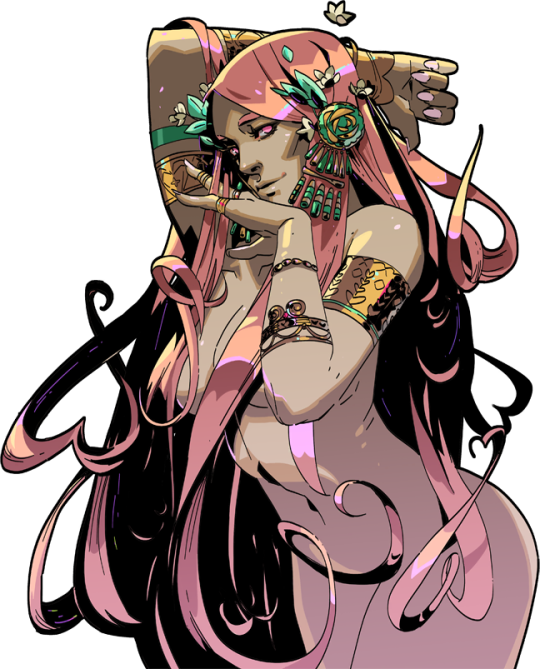
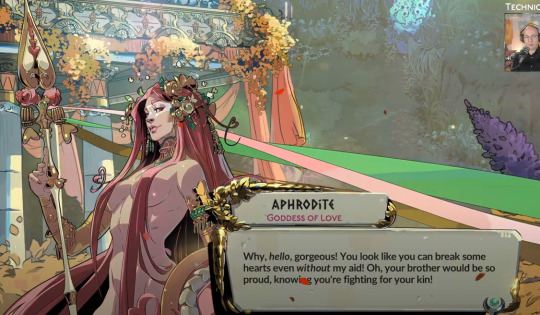
Second, I don’t know if this is intentional but I’m going to assume it is, I love how Supergiant has dug into less well known parts of Greek mythology. Zagreus and Melinoë, for instance, are attested to by a single source each that give next to no information other than their parentage. And they did it again with Aphrodite!
Like all Greek gods, Aphrodite was referred to by different epithets depending on what aspect of her was being referenced. One of her less famous epithets was Aphrodite Areia (“The Warlike Aphrodite”), which places her role as a goddess of war as well as love. Worship of Aphrodite Areia was mostly limited to Sparta, Taras, and Kythera.
Aphrodite was originally introduced to Greece as the Phoenician goddess Ashtarte, a goddess of war, love, fertility, lions, and Venus, who herself was borrowed from the Mesopotamian Ishtar/Inanna, a goddess of war, love, fertility, Venus, and rulership. She was spread to Greece by traders during the Greek Dark Ages, first coming to shore in Cyprus and Kythera, both of which are often cited as her birthplace.
Aphrodite Areia was probably more faithful to her original interpretation, but most of Greece ended up sanitizing the war associations out of her. The Iliad, written while that was happening, goes out of its way to portray her as incompetent in battle, she gets stabbed in the wrist by Diomedes and told by Zeus that she doesn’t belong on the battlefield. It’s conspicuous enough to sound like a pointed statement from the author. I do find it very funny that despite trying to remove her associations with war, the Epic Cycle also makes her directly responsible for starting the most biggest war in Greek mythohistory.
I love that her design is shedding light on this lesser known aspect of her, her pose even seems reminiscent of the surviving statues of Aphrodite Areia.
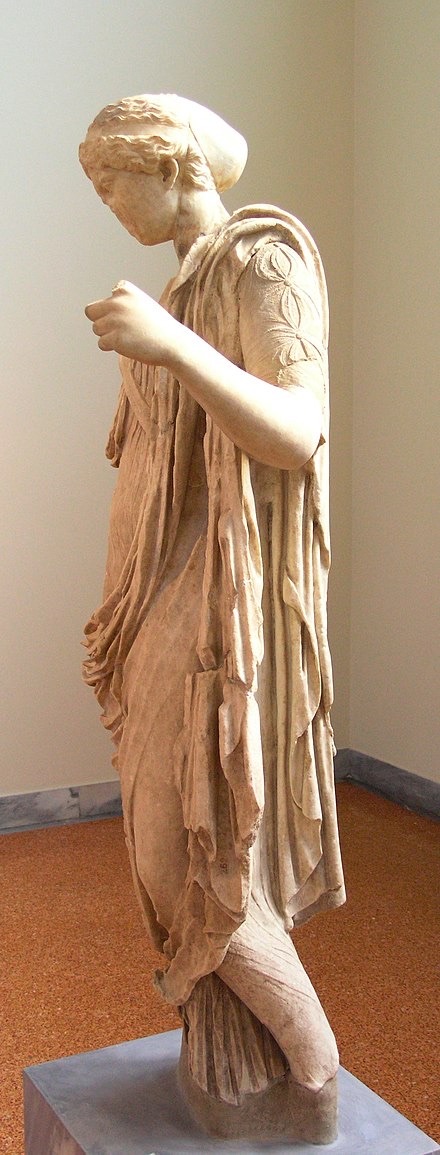
Another little detail is her new face paint, which is identical to Ares’ in Hades! Aphrodite Areia is associated with Ares even more than usual (Ares and Areia are cognate words, both from ‘are’ for war or ruin). Of course, Aphrodite is often depicted as Ares’ lover so this choice just works in general.
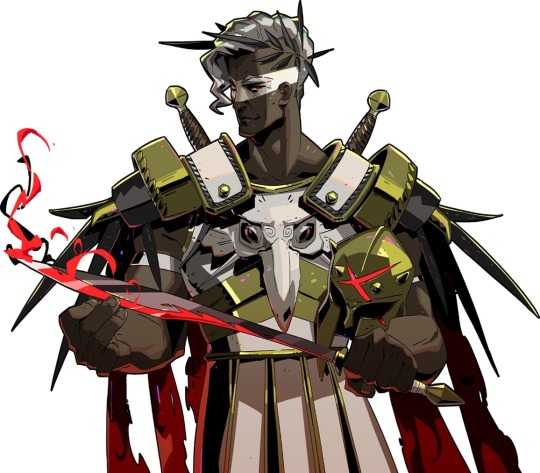
Anyways some real good character design here. Also the hair censoring is so good.
1K notes
·
View notes
Text
oooh! several related thoughts
(1) this au is a blast, it’s a very non-obvious crossover that nonetheless works really, really well - i think it’s the underlying genre match that really sells it, the vibe of the silm clashes hard with most modern works but the trojan war is equally mythic, equally grand, equally tragic. it feels like these worlds speak enough of the same language they could have something real to say about each other, like they’re variations on the same theme interpreted by totally different authors who nevertheless both get it. match made in heaven, fëanorian au of the year
(2) like, on a human level, i get wanting maedhros’ ragtag band of refugees to settle in númenor, but on the other hand i have the mental image of academic papers three thousand years later/one fourth wall up on The Cult of Maedhros Prometheus’ Son in Western Anatolia. because of course that’s what they’d do; that’s how their societies conceptualise power, their gods aren’t so much totally beyond humanity as a super-amped-up version of people, boy’s getting regular goat sacrifices before the century is out. does his cult wither in obscurity, or spread across the region? what stories do they tell about him, and how do those change over the millennia? who does he get syncretised with? how does hesiod fit him into the theogony????
(3) and on the other side of the interdimensional portal, the idea of odysseus interacting with maglor… really, really tickles me. late-game, bitter, sarcastic bastard mags, who on top of all his canon self’s issues is now stressed to hell and back because his older brother’s absence has left him in a place he never wanted be again - in charge. the banter would be legendary, and of the sort where you can never quite be sure someone’s not about to draw a knife
and i think, if anyone (on this side of the sundering seas, anyway) has a chance of figuring out what actually happened, it’s maglor? he’s a legendary bard in a world made of music, he’s… familiar enough with the structure of things to work it out for himself. he spends a frankly unsettling amount of time just staring at odysseus, going from humming random notes as if trying to get a fix on a melody to chanting nonsense syllables under his breath in perfect dactylic hexameter, tapping the ground with the tip of his scabbard to the beat
4) [SCENE: some unremarkable cove near (but not too near) the mouths of sirion, currently playing host to a boat that, while obviously of falathrim design, has some rather unusual iconography and a name in a language no one can read)
random human sailor odysseus cajoled into helping him try to get to valinor: i don’t get it, why’d the boss tell us to ready the ship in the usual place before he even gets back
another random human sailor, ditto: let’s hope whatever he’s plotting doesn’t - wait, do you hear that
odysseus: :suddenly bursts through the treeline, riding a very large horse that’s only partially under his control, a faintly glowing ball of cloth stashed under one arm:
odysseus: :dismounts with the air of a man who knows he’ll get kicked in the face if he pushes his luck any further: we have to cast off RIGHT NOW
random human sailor #3: boss what kind of túrin turambar-level nonsense -
odysseus :already leaping onboard: no time to explain move MOVE
sounds of pounding hooves, clattering metal, and absolutely furious quenya: :echo through the forest:
odysseus’ boat: :is already being shoved far beyond the horizon by a very convenient storm by the time the fëanorians reach the shore:
(odysseus later successfully bullshits maedhros that he’s been loaned the silmaril for the express purpose of getting the aid of the valar long enough to jump through the portal to ithaca and seal it shut behind him)
Maedhros in Troy AU: Outcome
Okay, so with the Maedhros in Troy AU, I have spent way more time on Maedhros than Odysseus.
BUT.
I think Odysseus might be the key to how this whole situation gets resolved.
Consider:
Odysseus finds Elured and Elurin and tries to find a way out of the woods. In the process, he comes across some of the other refugees from Doriath, who are very relieved to see their princes and very grateful to the man who rescued them. For lack of better ideas, Odysseus stays with them.
(He doesn't recognize these stars. How is he supposed to get home if he can't even recognize the stars - )
The refugees head to Sirion. Eventually, they manage to get past the language barrier well enough to communicate.
None of the elves know where Ithaca is, sorry, or how he might have gotten here, they don't know anyone who would know - except the Valar, of course, ha-ha -
The who? Odysseus asks, very interested.
Oh, well, the Valar, these superpowered not quite all knowing beings who live across the ocean -
That ocean? he asks, pointing, just to be sure.
(This is the man who saw Aeolus's island and decided he was going to climb it. Who was told to go to the Underworld and didn't hesitate. He is absolutely going to try to sail west.)
This is a bad idea, the elves say hastily. Everyone who has tried to sail west has been forced to turn back or die.
Odysseus tries anyway.
He is forced to turn back.
He keeps trying.
In between attempts, he picks up some knowledge of the Silmaril. He doesn't care about it particularly; he just can't avoid picking up on some things about it.
Like the fact the Valar, at least at one time, badly wanted it.
Odysseus steals the Silmaril and makes another attempt.
The Valar have so many questions for him when he shows up.
He does get back to Ithaca, though.
In less than twenty years.
(The Valar, in fixing this situation, also get Maedhros back. There are many awkward things about this situation; the Valar have the Silmaril but don't really consider themselves to rightfully hold it given how Odysseus got it in the first place; Maedhros is an exile who is not supposed to be in Valinor and who does not want to be here, and now they have to decide what to do about that - )
(It does not help the awkwardness that Maedhros, who has had to deal with Zeus's tantrums over his refusal to kill a baby, Aphrodite's tantrums for reasons he's not sure he wants to understand, Athena's demands to know where Odyssues is, Hephaestus and Ares being what they thought was helpful, Apollo's curse on Cassandra, and everyone's general surprise when he didn't think human sacrifice was the best solution for placating the storms - )
(Maedhros looks at the Valar thoughtfully and decides that, for all his problems with the Valar, he respects the fact that they are not the Olympians.)
(The Valar are deeply concerned with what they hear about the Olympians.)
(This may influence their decision that while the Trojans can't stay here-here in Aman, they can stay in Middle Earth.)
(Maybe with the Edain on that island they were thinking of raising . . .)
#ill advised crossovers#(that’s just my tag it’s not a judgement this is a very well advised crossover)#maedhros#odysseus#maglor#long post#i know just enough about greek mythohistory to know that i don’t know anything about greek mythohistory#so if i’ve gotten anything horribly wrong - i’m sorry!!!#and now i have the mental image of odysseus’ Quest To Find Out What You Sacrifice To Osse#you know. when he’s done you a solid. god handling best practices and all#also he may have gotten mildly cursed by mags on his way out but hey at least he’s back home#… and now i’m wondering how *he’d* go down in *arda’s* history#anyway yeah excellent au#greek mythology#epic the musical
177 notes
·
View notes
Text
the epic score is very fun in a lot of ways and odysseus murdering all the suitors at the end is delightfully chilling and very cathartic but i gotta say thinking abt odysseus’s perspective on that whole scene really makes me laugh like. you have been away from home for 20 years fighting first the biggest war in mythohistory and then what really seems like every fucking thing that could try to kill you in the entire adriatic sea. literally all your friends are dead and you just beat the shit out of an actual god to get back to the only two people in the world who matter to you anymore. and then you finally get back to your house after 20 FUCKING YEARS and it’s trashed bc a fucking frathouse worth of nepo babies who were like ten last time you saw them moved in while you were gone, bullied your family for well over a decade, and are currently planning how they’re gonna murder your son and assault your wife. no wonder he’s fuckin pissed
#i imagine he got into the palace and was just like. ‘oh you’ve gotta be fucking kidding me’#and then they stay shockingly cocky about killing him for a surprisingly long time??? and their plan is to ambush him in HIS OWN HOUSE?????#‘we know the palace so well dude he’ll never see us coming’ bitch WHAT are u talking about it’s HIS PALACE#the sheer audacity is honestly breathtaking#epic the ithaca saga#epic the musical#‘hey look all our weapons conveniently piled in this unlocked room!! wow it’s a good thing he just forgot to lock the door!!’#‘it would have been rough if we had to face the famously strategic and cunning warrior king without our suspiciously accessible weapons!!’#theyre so insufferable and also so fucking stupid it makes it really cathartic to hear them get absolutely bodied by greece’s Most Tired Man#odysseus#the suitors
111 notes
·
View notes
Text
As used, the term ‘precolonial’ Africa and the distortions it represents cannot illuminate our understanding of Africa and its history. More importantly, it is wrong to think of colonialism as a non-African phenomenon that was only brought in from elsewhere and imposed on the continent. Africa has given rise to a rich tapestry of diverse colonialisms originating in different parts of the continent. How are we to understand them? For example, if ‘precolonial Morocco’ refers to the time before France colonised Morocco, it must deny that the 800-year Moorish colonisation of the Iberian Peninsula, much of present-day France and much of North Africa was a colonialism. For, if it were, then ‘colonial Morocco’ must predate ‘precolonial Morocco’. I do not know how any of this helps us understand the history of Morocco. Similarly, a ‘precolonial’ Egypt that refers to Egypt before modern European imperialism would also deny Mohammed Ali’s colonial adventures at the head of Egypt in southern Europe and Asia Minor. Was ancient Egypt part of some precolonial formation? That strains credulity. To conceive of the history of Africa and Africans in terms only, or primarily, of their relation to modern European empires disappears the history of Africans as colonisers of realms beyond the continent’s land borders, especially in Europe and Asia. It is bad enough that the term distorts the history of African states’ involvement in overseas provinces. It is worse that it misdescribes the evolution of different African polities over time. The deployment of ‘precolonial Africa’ is undergirded by a few implausible assumptions. We assume either that there were no previous forms of colonialism in the continent, or that they do not matter. We talk as if colonialism was brought to Africa by Europe, after the 1884-85 Berlin West Africa Conference. But it takes only a pause to discover that this is false. African history is replete with accounts of empires and kingdoms. By their nature, empires incorporate elements of colonisation in them. If this be granted, Africa must have had its fair share of colonisers and colonialists in its history. When, according to the mythohistory (the founding myth of the empire) of Mali, Sundiata gathered different nations, cultures, political leaders and others to form the empire in the mid-13th century, he did not first seek the consent of his subjects. It was in the aftermath of their being subdued by his superior force that he did what Jean-Jacques Rousseau in the 18th century insisted all rulers should do if their rule is to escape repeated challenges and last for an appreciable length of time: turn might into right. Ethiopia, another veritable empire, is a multinational, multilingual, multicultural state whose members were not willing parties to their original incorporation into the polity. Whether you think of the Oromo or the Somali, many of their successor states within Ethiopia are, as I write this, still conducting anticolonial struggles against the Ethiopian state.
145 notes
·
View notes
Text
2024 Book Review #51 – Monstress Volume 8: Inferno by Marjorie Liu and Sana Takeda
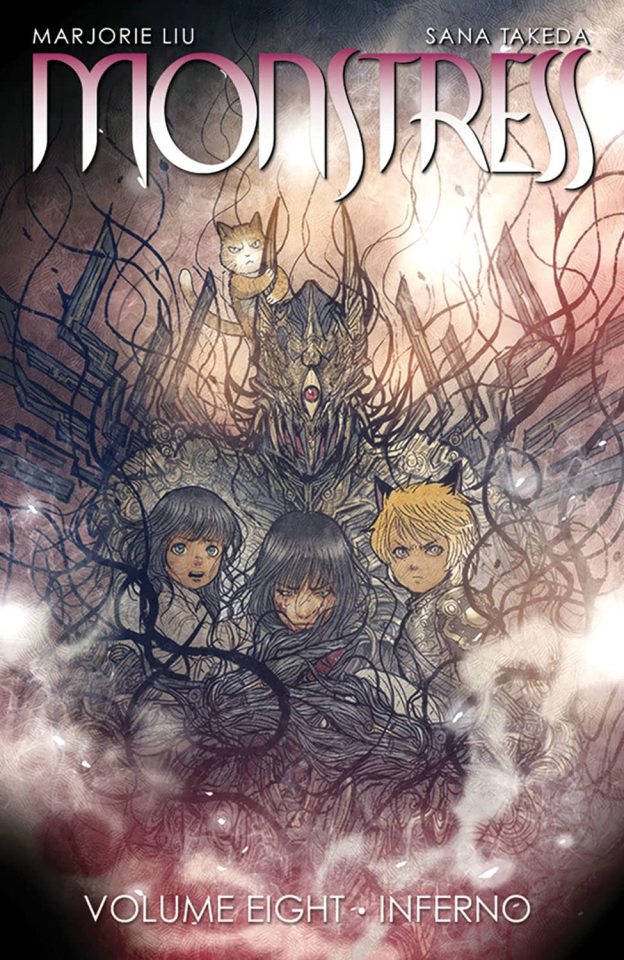
This is the last volume of Monstress that’s currently published and (since vol. 9 is coming out in November) the second-last I’m going to read this year. Which could be either a good or a bad thing, I suppose. This is the first volume I can say I genuinely didn’t enjoy, not even grading on a curve fro the highs of the rest of the series but in general. Not awful, but not good either – by far the most ‘comic-bookey’ plot arc so far, and I really don’t mean that as a compliment.
Through a variety of contrivances involving Maika’s friends journeying to the centre of her mind to try and wake her up from her coma and finding a massive and seemingly living statue of Adara Farclaw – the previously semi-mythical ancient hero-sage of the cats – our main cast (plus the ghost of Maika’s childhood self created by the sheer intensity of her own self-loathing) find themselves on the prison world where Zinn trapped all his kin to keep them from devouring the world we’re more familiar with back in pre-history. They’ve adapted surprisingly well, adopting humanoid forms and farming for the food they need. Immortal but sterile, their history since has been dominated by an endless race war between the first generation Fallen Houses (Zinn’s peers) and the second-generation and much reduced in grandeur (but increased in numbers) Defiled. Zinn, Maika, and the fragment of the Shaman-Empresses’ mask they brought with them are a chance to upset the balance of power, or perhaps even escape – and both sides are willing to do anything it takes for that chance.
Though all that plot aside, the actual point of the volume is to a) provide great reams of lore on the Monstra in general and Zinn’s past and present relationship with the rest of their species in particular and b) give Maika a chance to work on her self-esteem issues and guilt over accidentally killing and eating her mom as a child by providing a tulpa of 10-year-old her to scream at, protect, and reconcile with. Also a bunch of stuff about cats.
I can see the version of this story that works for me, at least in broad strokes. But yeah, the one that actually exists really didn’t. The largest part of that is just allocation of narrative resources, I think? As the book goes on, it has become steadily less interested in the themes and aesthetics I find more compelling to focus on it’s deep lore mythohistory and melodrama among the elder gods, to the point of just leaving the actual setting with its fascinating politics and societies entirely for basically the last two volumes. It begins to make me question why I’m still reading. Maika as a character is profoundly interesting, but having her just clearly announce her issues to a literal embodiment of them is not, to me, particularly compelling reading.
On an aesthetic level, the strange and alien prison planet let me deeply unimpressed. It was all so..familiar. Even the two warring nations of eldritch god-monster have ended up basically human-sized and human-shaped, farming and eating and using tools and building structures in instantly recognizable ways. There’s an excuse offered, but I’m still left wondering why even bother if it’s going to be so unspectacular.
I also found myself disappointing in how...monotonous, I suppose? The aesthetics of technology are growing to be. The guns, tools and armour of these cat worldwalkers who’ve been living underground on this prison world for centuries look almost identical to what technology of the Shaman Empress and the toys the Blood Court uses and- Even if you can torture and justify it all to make sense, it just gets boring and samey eventually, you know? Makes the world feel small.
Which is related to my thematic issues with the volume, in a way. The story is clearly much more interested in the grand, superhuman drama of the monstra, the exploration of multiple worlds and lost continents, space age high technology, more species and relics and myths and just – it all piles up so much that the result just ends up feeling more generic and boring than the more focused and detailed world of the first few volumes was. This is made far worse (for me, anyway) by the fact that Zinn seems to have been personally involved with literally every major historical personage that was mentioned at any point.
The most concise way to put it is that at the start of the story Maika et al really felt like people inhabiting a world, and now it’s at Star Wars levels of the world feeling like a canvas for a specific set of people’s melodrama. Nothing wrong with that, in the slightest – I just prefer the other, and feel a bit cheated by the shift.
On a different thematic level I kept waiting for some real, like, narrative pushback or reversal about how the Defiled are treated as these disgusting morally abhorrent abominations for the fundamental crime of being genetically impure and ‘spiritually mutilated’ and...never really got it?
Anyway, pacing wise the arc is much too short to be a complete, satisfying version of the story it wants to tell, and much, much too long to be a part of the longer story it is a detour from. The story never becomes offensively bad, but I am honestly reading as much out of inertia as anything by now.
19 notes
·
View notes
Note
Greek mythology has like several hot tomboys. The Amazons, Atalanta, Cyrene, if you consider pseudo mythohistory Alexander the Great had a bad ass warrior sister! But they chose transphobia smh.
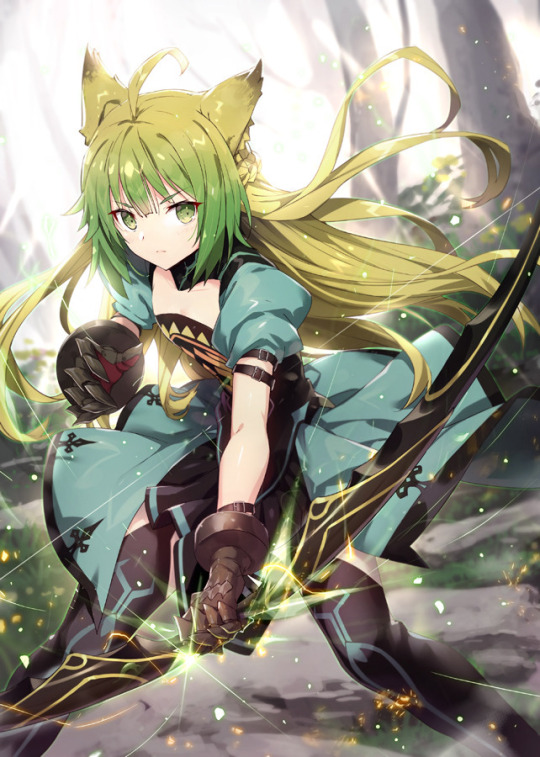
Atalanta does appear in the franchise but in the form of a fucking catgirl.
#they’re cowards for not making her a chubby bear girl#greek mythology#ancient greek mythology#greek pantheon#Greek heroes#Artemis#Atalanta#fate grand order
11 notes
·
View notes
Text
Tuatha dé Danaan (mythohistory)
The people from before the Deluge. They retreated from the coming waters, and ended up across the British isles. Legends of their fair skin and magical abilities abound, with very little concrete information on who or what they were, other than their conflict with the Fomorians.
10 notes
·
View notes
Text
If anyone familiar with Mexica/Aztec mythohistory wants to help me fuse together the identifying features of Tlazolteotl, Mictlantecutli, Mictecacihuatl, a Tzitzimitl, and the concepts of stars/the undead, hit up my dms homies 👍 Let’s be insane about precolonial Mexica gods together
#me when I have to make a newly complexed deity like oughhhhhhhhhhh#my goddess of decay and death made through the utterly toxic relationship of two codependent lesbians#character design#aztec mythology#d&d character designs#tenochtitlan girlies help me out here#or anyone else in the triple alliance actually#god I need to draw Tizoc eventually- he’s not a god but he’s my favorite tlatoani on purpose
5 notes
·
View notes
Text
If you love THE ACOLYTE you should read RONIN A VISIONS NOVEL by Emma Mieko Candon
The Jedi are the most loyal servants of the Empire.
You've probably seen a lot of stuff around the Acolyte about getting into the High Republic if you want more of the same. And while the High Republic is amazing and you should read it, beyond the in-universe worldbuilding connects and that they're both stories with a lot of Jedi, they're honestly not that similar when it comes to tone and theme. If what you like the most is the unique perspective The Acolyte is bringing to the franchise, you can find more of that in Ronin.
Ronin is an expansion of the season 1 Visions short The Duel. It proposes a much more interesting origin of the Sith than what is in Legends, where you have Jedi with the samurai influence turned up to max and they are the enforcers of a corrupt state and exploiters of the peasantry. There is no Light or Dark Side. And the Sith rise up against the exploitation of non-noble force sensitive Jedi, but in the end they're fighting for their own freedom including at the expense of others. Whether you identify as pro Jedi or not, seeing what the Jedi would be like if they were actually what their worst critics- both in and out of universe- claim is a great way to expand your perspective. It draws even more on jidaigeki and Japanese mythology in general. The writing style is very unique, invoking barely localized Japanese literature.
Two decades ago, Jedi clans clashed in service to feuding lords. Sickened by this endless cycle, a sect of Jedi rebelled, seeking to control their own destiny and claim power in service of no master. They called themselves Sith. The Sith rebellion failed, succumbing to infighting and betrayal, and the once rival lords unified to create an Empire . . . but even an Empire at peace is not free from violence. Far on the edge of the Outer Rim, one former Sith wanders, accompanied only by a faithful droid and the ghost of a less civilized age. He carries a lightsaber, but claims lineage to no Jedi clan, and pledges allegiance to no lord. Little is known about him, including his name, for he never speaks of his past, nor his regrets. His history is as guarded as the red blade of destruction he carries sheathed at his side. As the galaxy’s perpetual cycle of violence continues to interrupt his self-imposed exile, and he is forced to duel an enigmatic bandit claiming the title of Sith, it becomes clear that no amount of wandering will ever let him outpace the specters of his former life.
As for the similarities to the Acolyte, you got a darker tone, mystery, learning the backstory of characters as you go, a new way of seeing the Force, and witch(es).
It's also extremely queer. The main character in pansexual. One member of the main cast, the mysterious Traveler, is non-binary. There's also a sapphic romantic subplot.
It follows the Ronin right after the events of the Duel, where he is forced to join the Traveler, Chie- a bounty hunter who hunts Jedi while believing in her own Force religion, and Ekiya- a member of a people who the Sith displaced and forced to fight for them, now trying to regain her people's homeland. You also get to learn what the Sith Bandit's deal is.
It is in its own continuity (although it has also had some one-shot comics also telling original stories), although in my personal version of Star Wars it is a mythohistory about the ancient history of the Jedi and Sith. This means I don't have to stress out about the specifies of technology and magic, but can use the general gist to create my own narrative in my head.
7 notes
·
View notes
Text

@sillymuses : ✍ Favorite thing about writing the muse? For Twyla and Demona!


She's me! Between her love for reading and exploring history, her spooky aesthetic and sweet attitude, the fact that she's allowed to just exist as an autistic person and it doesn't become her entire personality, but people also acknowledge and accommodate her. I just adore her, and getting to expand on her backstory has been really fun so far !!

I love how complex Demona is. She's a victim of her own design, the arbiter of her own misery, and she's so damaged that she can't even recognize it. I love getting to explore the nuance of her villainy. She's the humanoid experience of pressing on a bruise just to feel it hurt. I'm just fascinated by her. Plus I'm a huge history / mythohistory nerd, so getting to play in those spaces is interesting.
Getting to harass Pom & Mal is just a bonus. uwu

mun talks about the muse

#sillymuses#❪ ⠀ ✦ ⠀ ─── ⠀ missallanea / answered ⠀﹕ ⠀did that make sense? ⠀ ❫#❪ ⠀ ✦ ⠀ ─── ⠀ missallanea / ooc ⠀﹕ probably hyperfixating on something. ⠀ ❫
2 notes
·
View notes
Text
Genuinely I love this latest story so much. Love our new rodent historian/Parabolan explorer friend, the new look into the mindspace and mythohistory of London's rodents, love being able to tell another fingerking to fuck off. Just a great story all around.
#fallen london spoilers#A dream of a thousand tails#As a noted rat lover I might be biased of course
3 notes
·
View notes
Text
I love you mythohistory I love you cosmogonies I love you mythemes I love you culture heroes I love you epic poetry I love you polytheism I love you alchemy I love you heresies I love you mystery cults I love you panpsychism I love you natural philosophy I love you metaphysics I love you mysticism I love you-
i love you fairy tales i love you folklore i love you myths i love you stories as old as humanity itself i love you oral traditions i love you characters carried through time on my ancestors’ tongues i love you story i’ve seen a million ways and want to see a million more i love you archetypes i love—
22K notes
·
View notes